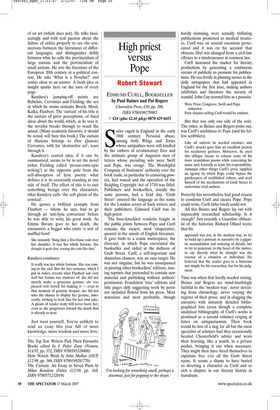High priest versus Pope
Robert Stewart
EDMUND CURLL, BOOKSELLER by Paul Baines and Pat Rogers Clarendon Press, £30, pp. 388, ISBN 9780199278985 ✆ £24 (plus £2.45 p&p) 0870 429 6655 Satire raged in England in the early 18th century. Personal abuse, among both Whigs and Tories whose antipathies were still kindled by the embers of revolutionary fires and the intimate group of Augustan men of letters whose presiding wits were Swift and Pope, was savage. The Worshipful Company of Stationers’ authority over the book trade, in particular its censoring powers, had waned and the operation of the fledgling Copyright Act of 1710 was fitful. Publishers and booksellers, usually the same persons, had a field day. ‘Grub Street’ entered the language as the name for the London coven of hack writers and their publishers. Edmund Curll was its high priest.
The bare-knuckled vendetta fought in the public prints between Pope and Curll remains the raciest, most vituperative, quarrel in the annals of English literature. It gave birth to a comic masterpiece, the Dunciad, in which Pope excoriated the bookseller and railed at the dullness of Grub Street. Curll, a self-important and shameless chancer, was an easy target. He was not singular, but he was unsurpassed in pirating other booksellers’ editions, issuing reprints that pretended to contain new material and publishing without authors’ permission. Fraudulent ‘true’ editions and title pages slyly suggesting work by poets not included flowed from his press. Most notorious and most profitable, though hardly damning, were sexually titillating publications promoted as medical treatises. Curll was on several occasions prosecuted and it was on his account that obscene libel was changed from a civil-law offence to a misdemeanor at common law.
Curll increased the market for literary productions by generating a continuous stream of publicity to promote his publications. He was fertile in planting stories in the daily newspapers that had appeared in England for the first time, making authors celebrities and literature the nursery of scandal. John Gay scorned him as a parasite.
Were Prior, Congreve, Swift and Pope unknown.
Poor slander-selling Curll would be undone.
But that was only one side of the coin. The other, as Baines and Rogers point out, was Curll’s usefulness to Pope (and his fellow scribblers).
Like all satirists he needed enemies, and Curll’s attacks gave him an excellent pretext for retaliatory gestures. Moreover, he used this oblique means to release some of his more scandalous poems while concealing his name and, formally at least, his responsibility. Amongst other things Curll’s press supplied an agency by which Pope could bypass the gatekeepers of established culture, and avail himself of the mechanisms of Grub Street to undermine rival authors.
Posterity has nevertheless had good reason to condemn Curll and excuse Pope: Pope could write, Curll (who tried) could not.
All this Baines and Rogers lay out with impeccably researched scholarship. Is it enough? Just recently a Guardian obituarist of the historian Richard Ollard wrote that his
approach was not, in the modern way, to try to build up a portrait or narrative by a gigantic accumulation and ordering of details, but to try to penetrate to the heart of the matter, to say directly what he thought was the essence of a situation or individual. He believed that the reader goes to a historian not simply for his researches, but for his judgment.
Time was when that hardly needed stating. Baines and Rogers are mind-numbingly faithful to the ‘modern way’, never deviating from chronology, never varying the register of their prose, and in clogging the narrative with minutely detailed bibliographical lists (even though a complete analytical bibliography of Curll’s works is promised as a second volume) verging at times on antiquarianism. Their book would be less of a slog for all but the most specialist of scholars had they occasionally heeded Chesterfield’s advice and worn their learning, like a watch, in a private pocket, bringing it out when necessary. They might then have freed themselves to expatiate free o’er all the Grub Street scene. It seems a shame to have buried so diverting a character as Curll and so rich a chapter in our literary history in humdrum.


































































































 Previous page
Previous page